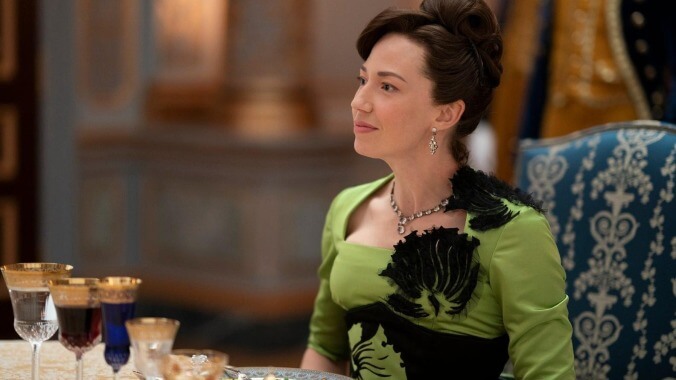Robber barons gonna rob on The Gilded Age
The 19th century goes STONK wild and it's Old Money who ends up on the tracks


Agnes: When you say those words, you stab me in the side.
Oscar: Then it’s good you have the skin of a rhinoceros.
After last week’s wonderfully profitable social disaster at the Charity Bazaar, one would think Morris and Fane, Charity Chairwomen Esq., would be down and out. Yet, Aurora is heading up another event this week in episode three‘s “Face the Music,” with a talk by American Red Cross founder Clara Barton (Linda Emond). The event doesn’t last long, but it gives Ada a chance to run into former beau Cornelius Eckhard III (Bill Irwin). It’s been a long time since he courted her, long enough that he missed Agnes’ entire marriage. Agnes is less than thrilled, assuming Eckhard thinks Ada has money. But then again, Agnes is convinced Raikes is pursuing Marian for the same reason. Funny how she projects since that’s all her son wants from Gladys. But when one is a hammer, everything must look like a nail.
Agnes seems right about Eckhard. She reveals her parents found out he boasted about marrying Ada for money, and when she asks if that’s still his motivation, he exits in a hurry. But she seems wrong about Raikes. Like Marian, he’s a wide-eyed innocent American who believes in the power of positive thinking and good intentions. He’s also wooing the hell out of Marian, proposing marriage at the Statue of Liberty’s Torchbearing Hand. She doesn’t say yes, but she doesn’t say no either.
While Peggy’s secrets continue to stew, a visit from her father, Arthur (John Douglas Thompson), the Mountain coming to Mohammed, gets quite the emotional heft. He begs her to take a trip home to Brooklyn for her mother’s birthday, and despite her reservations, she consents. As one might have picked up from the premiere, their quarrel is an expression of his terror the world will break his little girl while she fights to move it forward. Unsurprisingly, Peggy continues to be the only downstairs story worth its salt.
Arthur’s not wrong to be afraid. Peggy’s writing has caught the eye of a publisher at The Christian Advocate, a white newspaper. Unsurprisingly, upon seeing her face, her appointment turns into being forced to wait all day before she’s allowed in. That they see her at all is slightly stunning, as is the declaration they are willing to publish her work. However, the story they want to print— about a little Black girl’s redemption—must be changed to a poor white child. Moreover, she must sign a contract giving up not just the rights to her stories altogether, but the ability to ever claim ownership in the first place, lest the magazine’s southern readership ever get wind they are reading the words of a Black woman. Peggy walks out without a backward glance.
Meanwhile, across the street, after two episodes of bubbling away in the background, the Russell railroad plot finally roars to life. We know things are about to go south between George and the insider-trading alderman, as Carrie Coon is in a purple and blue gown that constitutes the first low-key dress she’s worn. It turns out insider trading was only the beginning for Patrick Morris and his old money pals. Having passed the law allowing George to build a new train station, thereby making a profit on their shares, they’re turning around, shorting the stock, and repealing the law so his shares tank. (Quick! Someone call the SEC! J/k, they won’t be invented for another 50 years until after the 1929 stock market crash, and this is all legal!)
George is genuinely startled by this turn, proving Bertha isn’t the only one underestimating Old New York. But the man didn’t make a fortune by being a fool; he can see the next move in this chess game. Once the stock crashes and George is wiped out, the aldermen will repurchase the shares for pennies, repass the law, tripling their fortunes, and take his company out from under him. Though Patrick complained about their tactics, Mmes. Astor and Morris aren’t the only ones working to keep the new money from horning in. Their husbands are working just as hard to take down George as the women are to shun Bertha.
George tells Bertha there’s only one play here, but it’s going to take all their money to do it: secretly buy back the stock everyone is shorting to hold the value line. As those who paid attention to the STONKS story last year will remember, the shares have to crash for the short sellers to make a killing. If the stock doesn’t drop—in fact, if it goes up—they are hosed. It’s a hell of a gamble, but Bertha is all in. (George and Bertha’s genuine love and respect for each other is such a highlight of this series.) If the aldermen don’t have much invested, Morris and co. will hold out, and the Russells will eventually run out of money. The stock will crash, and George and Bertha will lose everything. But if the aldermen have gone deep, George only has to keep buying for a few days. He doesn’t have to outrun the tiger, just outrun them.
As George gets down to his figurative shirtsleeves and shovels coal—er, buys back stock—we discover Patrick Morris didn’t just go deep. He bet his entire savings, as did his fellow alderman, Charles Fane (Ward Horton), Aurora’s husband. The latter tries to put a good face on it, but he tells Aurora to her utter horror that if the stock hasn’t crashed by morning, they’re broke. Patrick insists Anne’s insulting Bertha is the real driver of George’s play; he wouldn’t ruin his fellow men just over a bit of stock hanky panky. However, her groveling at Bertha’s feet goes precisely nowhere. In the end, Messrs. Morris, Fane, and company wind up in George’s office, with Patrick down on his knees begging for mercy. George admits he might have relented, but the behavior of their wives has sealed the deal, and there will be no mercy.
Who knew a choice to rent a hotel ballroom could lead to such a tragic end? Perhaps Mrs. Morris can borrow Bertha’s ballroom for her husband’s funeral, as Patrick takes his own life rather than face ruin.
Stray Observations
- The Statue of Liberty’s torch-bearing arm was displayed in Madison Square Park from 1876 to 1882, and the bit about the struggle for fundraising is true.
- For all that Gladys is technically not out, she’s certainly about when convenient. Last week it was dress shopping with Turner as a chaperone; this week, it’s traipsing off with the governess, Mrs. Grant, to see Archie Baldwin. Unfortunately, they live on 35th, which means there’s no way Bertha will approve.
- The van Rhijn’s founding of the United Manhattan Trust in 1797 is almost certainly based on the Manhattan Company, founded in 1799 and known today as JP Morgan Chase.
- That bit about Bertha’s Irish family picking potatoes when the van Rhijns were founding banks suggests her family was part of the immigration wave following the Great Hunger.
- John Adams clearly hoped he and Oscar could bachelor it out. Poor man.
- I don’t know if I care yet about the budding romance downstairs at the van Rhijn House, but I loved the Magic Lantern Show.
- The Gilded Age was filmed in 2021 when Broadway was still mostly shut down, but the sheer number of Tony winners guest-starring in this cast is something else. Is it too much to hope for a musical episode in season two?
- Speaking of the arts, that’s the old Metropolitan Opera House the “malcontents” are building.
- Bertha rewore both the gold leaf dress and the purple chiffon bustle gown from the premiere. But Dress Of The Week goes to her purple velvet and silk number from the episode’s final moments as the Russells grind the Morrises to dust.